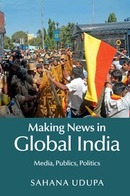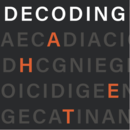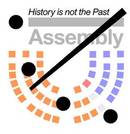Contact
Institut für Ethnologie
Oettingenstr. 67
80538 München
Room:
C 010
Phone:
+49 (0) 89 / 2180 - 9614
Fax:
+49 (0) 89 / 2180 - 9602
Email:
sahana.udupa@lmu.de
Office hours:
on Fridays 14:00-15:00
Areas of research and interest
Digital politics, politics of artificial intelligence, global digital cultures, online extreme speech and hate speech, news and journalism, urban politics, and media policy.
Sahana Udupa is Professor of Media Anthropology at LMU Munich, and BKC Faculty Associate, Berkman Klein Fellow (2024-2025) and Joan Shorenstein Fellow at Harvard University (2021). She is currently setting up a new project on contentious speech on small social media platforms in Kenya, Germany, Britain, and India. The project is funded by the European Research Council Consolidator Grant award. She has also directed ERC starting grant, ERC proof of concept grant, Henry Luce Foundation grant and BIDT-funded projects on AI and content moderation; religious politics on social media; and online misogyny. These projects, with a core team of postdoctoral researchers at LMU and a wider, international network of scholars, explores the influence of internet-enabled media on political cultures of networked participations, especially extreme forms of speech and their implications. More about the projects: www.fordigitaldignity.com. In 2021, the United Nations Department of Peace Operations commissioned her to write a research paper on digital technology and extreme speech, which was published as part of the UN digital transformation strategy for peace operations. She serves on the advisory board of MediaWell, an initiative by the Social Science Research Council.
Prior to joining LMU Munich, Udupa was Associate Professor of Journalism and Media Studies at the School of Public Policy, Central European University, and Research Fellow at the Max Planck Institute for the Study of Religious and Ethnic Diversity.
Across ongoing research projects, Udupa’s work has traced the transforming media and urban landscapes of late capitalism. Conceptually, her work raises the question of "mediation" as a media technological, performative, and experiential space to articulate political practice. Keen to create conversational spaces between research and communities, her projects have sought to translate research findings into possibilities in the “real world”, inviting policy makers, critical scholars and students to join hands in a collaborative effort to address the “dark side” of digital communication. She is eager to work with students committed to critical research on digitalization and digital media, especially to devise ways to creatively think through issues of marginalization and digital harms as well as the potentiality of digital participations.
Her first book, Making News in Global India: Media, Publics, Politics (Cambridge University Press, 2015) is a critical reading of news cultures and urban transformation based on multiyear ethnography in the city of Bangalore. It shows how the expanding news media played a critical role in the contested aspiration of building a 'global city' in India, when commercial journalism became both an object and agent of global urbanization. More about the book in the New Books Network podcast available here.
The second book, “Digital Hate: The Global Conjuncture of Online Extreme Speech” (co-edited with Iginio Gagliardone and Peter Hervik) is published by the Indiana University Press in 2021. The volume “provides the first distinctly global and interdisciplinary perspective on hateful language online”, and is fully open access.
Her third book, “Digital Unsettling: Decoloniality and Dispossession in the Age of Social Media” (co-authored with Ethiraj Gabriel Dattatreyan) is published by New York University Press (2023). Focusing primarily on social media and staging a number of examples of platform entangled politics and digital mobilization globally, Digital Unsettling sets the theoretical ground and unfolds a methodology to place ‘the digital’ in the longue durée of coloniality.
She is currently completing a new monograph on artificial intelligence and extreme speech (contracted with New York University Press).
The new co-edited book, “WhatsApp in the World: Disinformation, Encryption and Encryption” (2025, New York University Press, with Herman Wasserman), presents a global analysis of the vastly popular instant messaging service, delving into the complex interplay between encryption and extreme speech.
She is also currently co-editing “Handbook on Anthropology and Artificial Intelligence” (Edward Elgar Publishing, with Peter Hervik).
With Stephan McDowell, she has published a co-edited volume, “Media as Politics in South Asia” (2017, Routledge).
In recognition of her contributions to digital research, Belgium based Francqui Foundation awarded her the Francqui Chair in 2022. As part of the award, she gave a series of lectures on digital politics at the KULueven University. In 2023, the article, “Ethical scaling: Extreme speech and the (in)significance of artificial intelligence”, which she co-authored with Antonis Maronikolakis and Axel Wisiorek, won the International Communication Association Outstanding Article award
Udupa is the co-editor for the book series, “Anthropology of Media”, published by Berghahn (New York). She serves on the editorial boards of American Ethnologist; Journalism: Theory, Practice and Criticism; Communication, Culture & Critique; Television & New Media; and Media Theory Journal. She is the co-convener for the Media Anthropology Network at the European Association of Social Anthropologists.
BOOKS
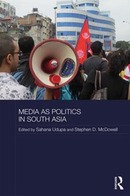 |
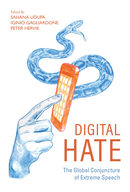 |
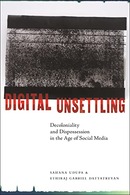 |
RECENT JOURNAL ARTICLES & PODCASTS
|
|
POLITICS OF ABUSIVE |
|
PODCAST: History is not the Past |
|
New Book Release:
|
Edited by Sahana Udupa and Herman Wasserman Published by: NYU Press
|






